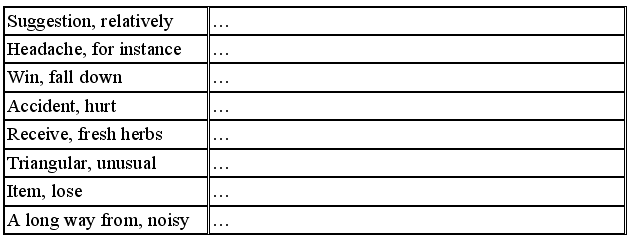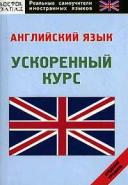Книга: Английский язык: самоучитель
FOCUS ON VOCABULARY Активный словарь
Разделы на этой странице:
FOCUS ON VOCABULARY
Активный словарь
Nouns
1. agreement – cоглашение, согласие
2. discussion – обсуждение
3. suggestion – предложение
To make a suggestion – внести предложение
4. reason for – причина чего-либо
5. majority – большинство
6. welfare – благополучие
7. education – образование
Primary/secondary/high education – начальное/среднее/высшее образование
8. item – пункт (списка), предмет (в списке)
9. purse/wallet – кошелек/портмоне
10. ache – боль
11. stomachache/toothache/headache – боль в желудке/зубная/головная
12. temperature – температура
To take one’s temperature – измерять температуру
13. shoulder – плечо
Shoulder length – длиною до плеч
14. support – поддержка
Friendly support – дружеская поддержка
15. solution – решение
Problem solution – решение проблемы
16. accident – несчастный случай
17. pain – боль (острая)
18. ambulance – скорая помощь/машина скорой помощи
19. barrier – барьер
20. emotion – эмоция, переживание
21. isolation – изоляция, отстранение
22. stamina – выдержка, выносливость
23. strength – сила, прочность
24. waist – талия
25. wrist – запястье
Adjectives
1. still – тихий, бесшумный
2. ill – больной
to be ill/to fall ill – болеть/заболеть
3. tight – плотный, компактный
4. careful – аккуратный
5. crucial – решающий, критический
6. mobile – подвижный, мобильный
7. noisy – шумный
8. quiet – спокойный
9. dirty – грязный
Verbs
1. to measure – измерять
2. to remain – оставаться
3. to fall – падать
to fall down
4. to win – выигрывать, побеждать
5. to worry – беспокоить(ся)
6. to cut – резать, отрезать
7. to lose – терять, проигрывать
8. to receive – получать
Adverbs
1. freely – свободно
2. relatively – относительно
relatively difficult
Word Combinations
1. first course – первое блюдо
2. fresh herbs – свежая зелень
3. a long way from – далеко от
4. set off for – направиться куда-либо
5. horse-riding – верховая езда
6. what’s the matter – что случилось, в чем дело
7. for instance – например
8. hurt one’s feelings – ранить чьи-либо чувства
9. look out – опасаться, быть настороже
10. be in somebody’s shoes – быть в таком же положении, как кто-либо
1. Match the word with the translation.
Найдите соответствие между словом и переводом.
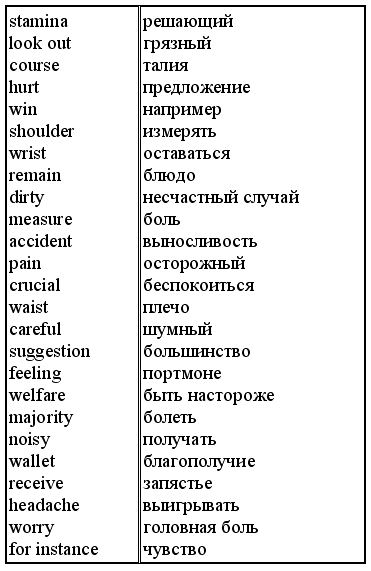
2. Make word combinations.
Составьте словосочетания.
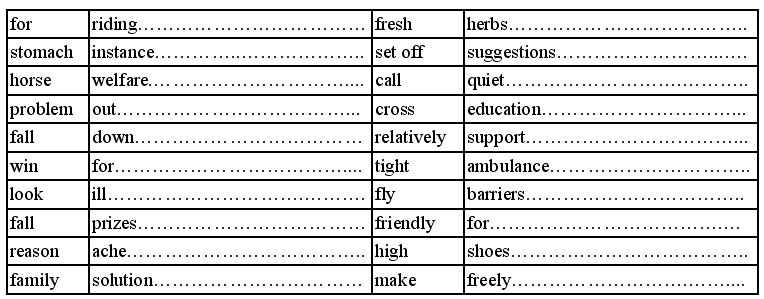
3. Answer the questions. In each of your answers there must be two words from the Active Vocabulary.
Ответьте на вопросы так, чтобы в каждом из Ваших ответов было по два слова из Активного Словаря.
1. Do you feel any pain?
………………………………………………………………………………………………….
2. What will you have for dinner?
………………………………………………………………………………………………….
3. Can you live in isolation?
………………………………………………………………………………………………….
4. Where does it hurt?
………………………………………………………………………………………………….
5. Did you have an accident?
………………………………………………………………………………………………….
6. What’s the matter?
………………………………………………………………………………………………….
7. When did you fall ill?
………………………………………………………………………………………………….
8. Where are the majority of your colleagues now?
………………………………………………………………………………………………….
4. Translate into English.
Переведите на английский язык.
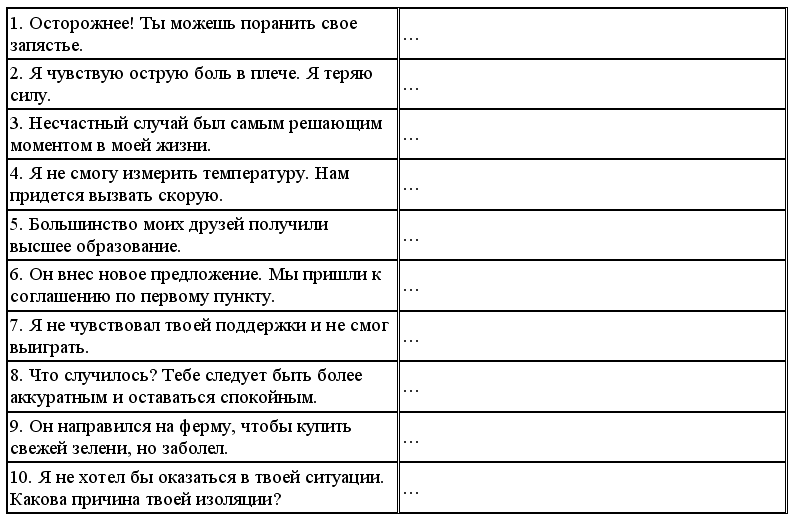
Language focus 1
Describing things.
Как описать предметы.
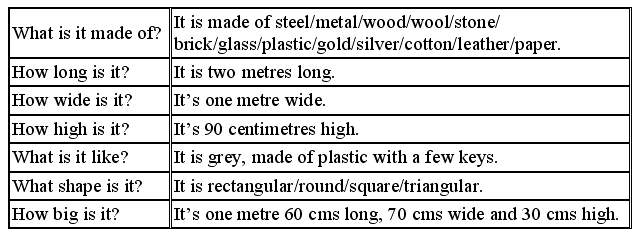
5. Read and choose the correct question.
Прочитайте и выберите подходящий вопрос.
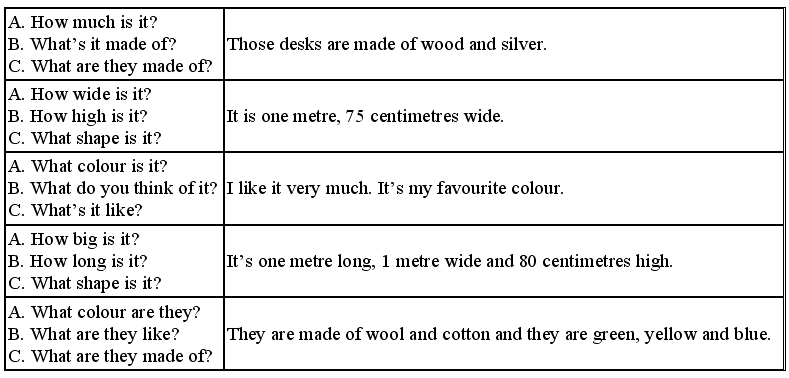
6. Answer the questions.
Ответьте на вопросы.
1. How big is your desk?
…………………………………………………………………………………
2. What is your favourite sweater made of?
………………………………………………………………………………….
3. What is your watch like?
………………………………………………………………………………….
4. What shape is the looking glass in the bathroom?
………………………………………………………………………………….
5. How high is the wardrobe in your bedroom?
…………………………………………………………………………………
6. What are the majority of the houses in your street made of?
…………………………………………………………………………………
7. What is your flat like?
…………………………………………………………………………………
8. How wide is your desk?
…………………………………………………………………………………
9. How long is the longest river in Russia?
…………………………………………………………………………………
10. What do you think of your new computer?
…………………………………………………………………………………
7. Describe the following objects.
Опишите следующие предметы.
How big is it? How high is it? How wide is it? How long is it? What is it like? What colour is it? What is it made of?
What shape is it? What do you think of it?
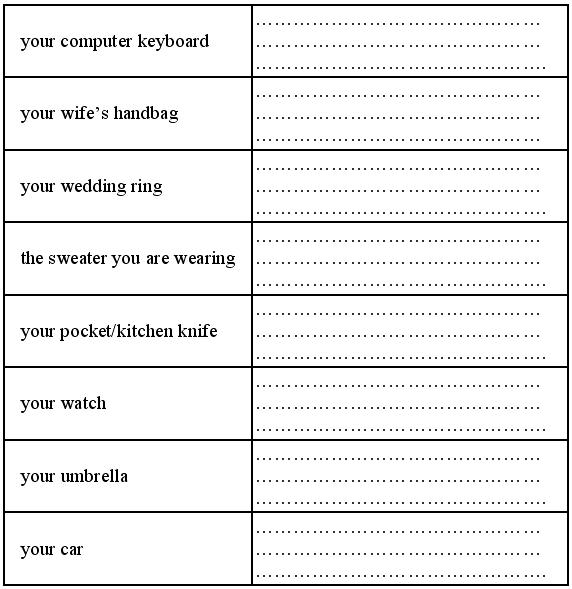
Language focus 2
Some Linking words
Слова-связки
Слова-связки (например, but, and) широко используются как в русском, так и в английском языках для связи предложений.
Наиболее часто употребляемыми являются следующие:
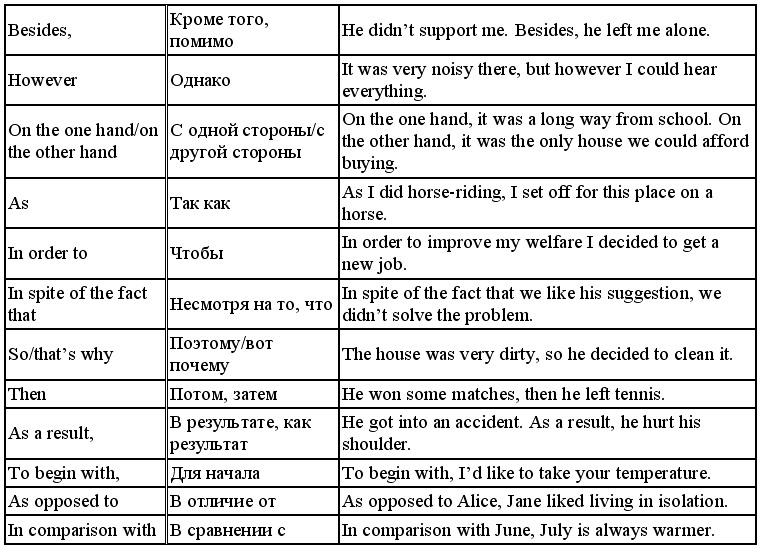
8. Read the sentences and give their translation.
Прочитайте и переведите данные предложения.
1. Lisa didn’t support her. As a result, she had no time to cater for her family welfare.
………………………………………………………………………………………………….
2. As opposed to Jane, Jack made a good suggestion.
………………………………………………………………………………………………….
3. In spite of the fact that the desk was 1 metre wide and made of wood we decided to buy it.
………………………………………………………………………………………………….
4. He measured the carpet, but then he lost this information.
………………………………………………………………………………………………….
5. In order to win the game she had to be very mobile and careful.
………………………………………………………………………………………………….
6. My stamina is down. Besides, I won’t be able to live in isolation.
………………………………………………………………………………………………….
7. As I worried a lot about his health, I decided to call the ambulance.
………………………………………………………………………………………………….
8. My shoes were too tight. That’s why my feet hurt.
………………………………………………………………………………………………….
9. What’s the matter? You look awful!
To begin with, I lost my wallet. Besides, I fell down and hurt my leg.
………………………………………………………………………………………………….
10. Look out! He wanted to come to an agreement with you. However, he remains silent.
………………………………………………………………………………………………….
9. Make up sentences using the following words. Use the Linking words given below.
Составьте предложения, используя данные слова. Также используйте слова-связки, предлагаемые ниже.
As a result, however, as opposed to, besides, in spite of the fact that, as, to begin with, in comparison with,
on the one hand/on the other hand, then, so, in order to
